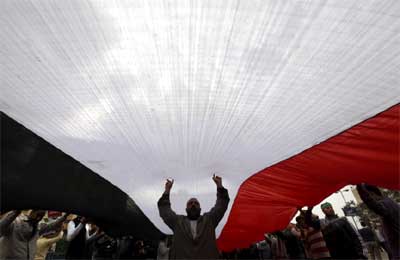
Muslim Brotherhood meets financial reality
Dubai, January 7, 2013
Una Galani
(The author is a Reuters Breakingviews columnist. The opinions expressed are her own.)
Financial reality is catching up with Egypt's Muslim Brotherhood. Fresh capital controls and the fall of the pound underscore the critical level of the country's foreign reserves and the risk of higher inflation.
The ruling Brotherhood must finalise an unpopular deal with the International Monetary Fund without delay, or it could face a currency meltdown. Neither option is appealing ahead of upcoming parliamentary elections.
The pound has shed 11 percent of its value since the Tahrir square uprising almost two years ago. Around half of that decline has taken place in the past month. The crisis over the country's constitution, triggered by the heavy-handed political maneuvering of President Mohammed Mursi, has heightened the sense of political and financial instability.
There are no up-to-date, official statistics on the dollarisation of the economy, but enough Egyptians have rushed for dollars to result in a shortage of supply. If sustained, a full-scale black market in currency trading could soon return. At 6.45 against the dollar, the pound is at its weakest level since Egypt adopted a "managed-float" policy in 2004.
The central bank hasn't given up its costly defence of the pound, even with foreign reserves - around $15 billion - down to barely three months of imports. Egypt is allowing a steady depreciation limiting the daily decline through a new, more transparent, system of foreign currency auctions introduced last week. But these have already cost the bank $360 million.
In the absence of more financial handouts from its neighbours, Egypt needs to secure a deal with the IMF to shore up confidence and ensure that any devaluation - and resulting inflation - can be managed in an orderly fashion. Egypt is a large importer of food. Though the state subsidises basic goods, the poor will find it hard to cope with rising prices of other products, even with official inflation at a six-year low of 4.3 percent.
The Brotherhood could face elections as soon as February. To win a deal with the IMF, the government must show a commitment to fix its finances and enact unpopular economic reforms. That will help boost the vote for the opposition. Doing nothing, however, will hurt most the poorest Egyptians that form a large part of the Brotherhood's powerbase. – Reuters







